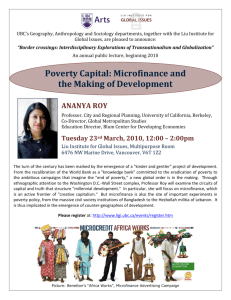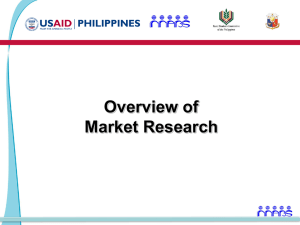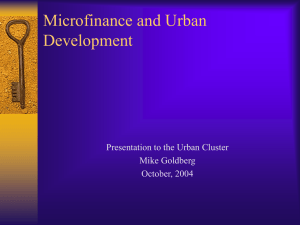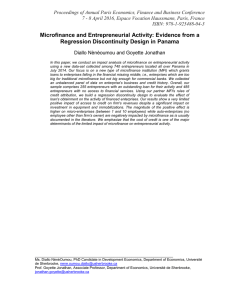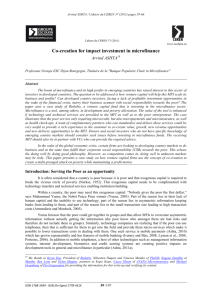SmartAid for Microfinance Index Alexia Latortue December 16, 2008
advertisement
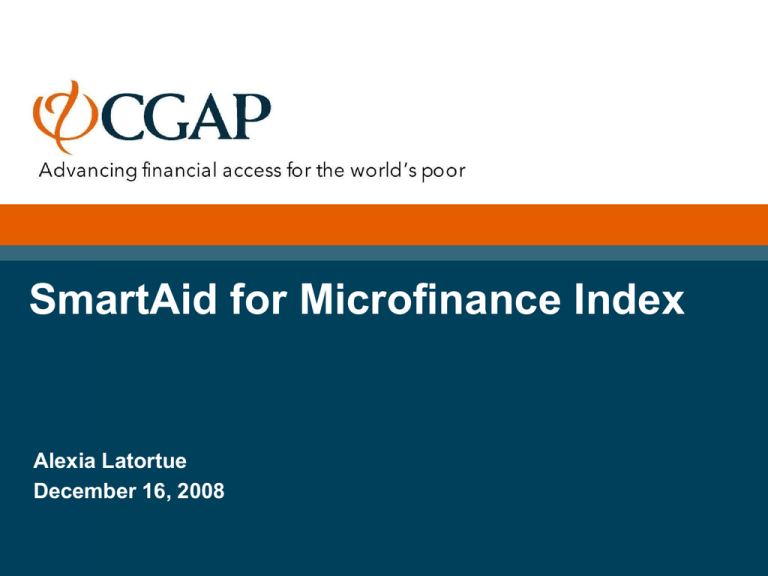
SmartAid for Microfinance Index Alexia Latortue December 16, 2008 Microfinance and aid effectiveness CGAP…. not in the Index business Microfinance: Everyone’s new favorite Significant funding for microfinance Number of respondents: 54 Note: Global projects are not included in this graph. They account for about 1,094 million USD (9%). SmartAid: Where are we coming from? Aid Effectiveness Initiative: Microfinance as a Test Case Better Aid for Access to Finance Meeting 1st High Level Meeting 2002 2003 Peer Reviews AfDB, AFD, AsDB, CIDA, Danida, DFID, EC, GTZ, ILO, IFAD, KfW, Netherlands, NORAD, Sida, SDC, USAID, UNDP Portfolio Reviews IDB, UNDP and World Bank 2004 2005 2006 2007 2008 Country Reviews Uganda, Cambodia, Nicaragua, Madagascar, Sri Lanka, Pakistan SmartAid for Microfinance Index What SmartAid is A service to development institutions – determine where change is needed – provide incentives to improve – help identify comparative advantage and opportunities for collaboration A means to promote transparent assessment of funders A communication tool to participate in discussions on aid effectiveness Fundamental premise: Change starts at home Effective internal management systems Better design, implementation & monitoring Increased scale and quality of access to financial services Reduced vulnerability and increased incomes Contribution to Millennium Development Goals Measures whether funding agencies are set up to support microfinance effectively What SmartAid measures Strategic Clarity 1. Policy and strategy that addresses microfinance, is in line with good practice, and is based on its capabilities and constraints 15 points 15points Staff Capacity 2. Designated microfinance specialist(s) who are responsible for technical quality assurance throughout the project/investment cycle 3. Investments in microfinance/access to finance human resources 10 points 4. Flagging system for all microfinance programs and components 10 points 5. Tracking and reporting on performance indicators 10 points 6. Use of performance-based contracts 10 points 7. Portfolio reviews are regularly conducted 10 points 8. Systems and resources for active knowledge management 10 points 9. Appropriate instrument(s) to support the development of local financial markets 10 points Accountability for Results Knowledge Management Appropriate Instruments How SmartAid works Funder receives SmartAid Submission Guide with nine indicators Funder implements changes; CGAP available for advisory services SmartAid Report Ongoing discussion with management and technical staff Funder provides documents for each indicator A Review Board of four microfinance experts reviews documents and assigns a score SmartAid: More than just a score A tailored report… Strengths and weaknesses Good practice example Recommendations for improvement A learning process… Debriefings with management and technical staff Assistance in prioritizing recommendations and developing an action plan Pilot round in 2007: results Seven pioneering funders: AsDB, CIDA, FMO, GTZ, KfW, Sida, and UNCDF 5 Scores 4 3 2 1 Strategic Clarity Staff Capacity Accountability median score Knowledge Management Appropriate Instruments Pilot round in 2007: What funders say ―SmartAid is useful for UNCDF both internally and externally. Internally, we created an action plan to put the recommendations into practice. Not all actions will be completed in the next year, but they are underway. Externally, it has helped us identify where the other agencies are strong and how UNCDF can partner with them.‖ John Tucker, UNCDF ―SmartAid helps us rethink our microfinance operations — what works well, what does not work so well.‖ Nimal Fernando, AsDB ―At first, GTZ was worried because as a technical assistance provider we were not sure if the interpretation of the results would make sense. But it worked. SmartAid is credible and so are the indicators. It was easy to provide documents for the indicators. The trust in CGAP is an important component.‖ Gabriela Braun, GTZ Lessons learned • Broad consensus on validity of five elements of effectiveness • Consultative development process of Index creates buy-in • Adding opportunities for discussion/exchange around paper-based methodology is key • Change is possible, but a strong mandate from top management and continuity in staffing is necessary • Measuring agency-wide systems can be a challenge • Not all that matters can be measured, not all that can be measured matters Critical success factors • Evidence to validate link between systems and outcomes/impact • Incorporating new funders, including private aid flows • Linking sectoral effectiveness initiatives like SmartAid to broader efforts • Getting to the incentive gap – balance between carrots and sticks Advancing financial access for the world’s poor www.cgap.org www.microfinancegateway.org
